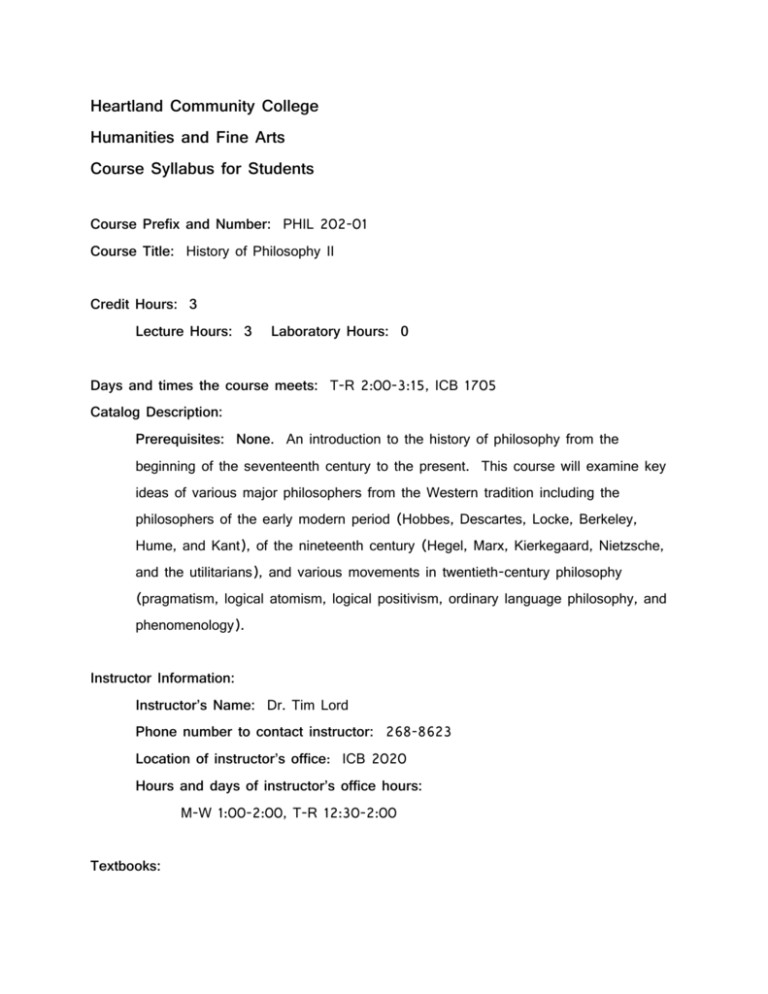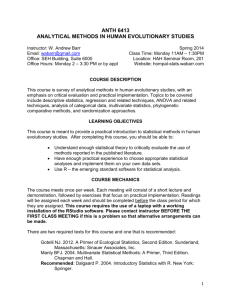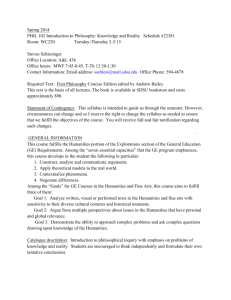phil20201 - Heartland Community College
advertisement

Heartland Community College Humanities and Fine Arts Course Syllabus for Students Course Prefix and Number: PHIL 202-01 Course Title: History of Philosophy II Credit Hours: 3 Lecture Hours: 3 Laboratory Hours: 0 Days and times the course meets: T-R 2:00-3:15, ICB 1705 Catalog Description: Prerequisites: None. An introduction to the history of philosophy from the beginning of the seventeenth century to the present. This course will examine key ideas of various major philosophers from the Western tradition including the philosophers of the early modern period (Hobbes, Descartes, Locke, Berkeley, Hume, and Kant), of the nineteenth century (Hegel, Marx, Kierkegaard, Nietzsche, and the utilitarians), and various movements in twentieth-century philosophy (pragmatism, logical atomism, logical positivism, ordinary language philosophy, and phenomenology). Instructor Information: Instructor’s Name: Dr. Tim Lord Phone number to contact instructor: 268-8623 Location of instructor’s office: ICB 2020 Hours and days of instructor’s office hours: M-W 1:00-2:00, T-R 12:30-2:00 Textbooks: Melchert, Norman. The Great Conversation: A Historical Introduction to Philosophy Volume II (Descartes through Derrida and Quine). 4th ed. Boston: McGraw-Hill, 2002. Anne Michaels Edwards. Writing to Learn: An Introduction to Writing Philosophical Essays. Boston: McGraw-Hill, 2000. Relationship to Academic Development Programs and Transfer: PHIL 202 fulfills 3 of the required 9 semester hours of credit in the Humanities for the A.A. or A.S. degrees. It is a General Education course and is included in the Illinois Articulation Initiative. Therefore, it should transfer to any Illinois college or university as a general education requirement in the Humanities. Check with an advisor about transferability to particular institutions. Beliefs: Academic discipline: I believe that coming to knowledge is a historical process that demands that one reflect on one's history. This is true both for individuals and for disciplines such as philosophy, although for neither is coming to knowledge merely linear and progressive (i.e., neither involves a continual and gradual movement toward "truth"). Consequently, we need to continually assess where we have been and where we hope to be. Doing so requires understanding that, both as individuals and as students of philosophy, all of our inherited assumptions about the world and philosophy are open to criticism and revision. Student learning and responsibilities: Student learning in philosophy is based on "the three R's" and a D: reading, reflection, (w)riting, and dialogue. Because philosophy is a very challenging discipline, you will need to read the assignments carefully and probably more than once (two hours of studying for every hour in class is probably about right). You should think carefully about the reading, formulate a particular question/comment, write it down, and come to class ready to ask or state it at an opportune time. Also, you should be prepared to discuss your ideas. Philosophy is a discipline that, at its inauguration with the Greeks, was grounded on dialogue. Discussion is still imperative to both learning about and doing philosophy; therefore, participation in class discussions will be necessary for doing well in this course. Instructor’s role: I see myself as a quite fallible expert who will serve as a facilitator of discussions and resource person. Course Objectives (Learning outcomes): After completing this course you should be able to 1. Outline philosophy's historical development, matching important works with the philosophers who wrote them and important beliefs with the philosophers who held them. 2. Identify the historically dominant philosophical "problems," which philosophers dealt with each of them, and why they have become viewed as "problems." 3. Appraise the effectiveness of various solutions that have been proposed to the main philosophical problems. 4. Contextualize various philosophies and philosophical problems within the societies and cultures that gave rise to them, identifying the social phenomena that provided the impetus for solutions to those problems. 5. Analyze critically the extent that a philosopher's identity, assumptions, and social context influence his or her perspective or beliefs. 6. Improve your ability to aptly interpret difficult philosophical texts and support those interpretations with reasoned arguments. 7. Reflect on the historical processes and experiences that enable human beings to come to knowledge. 8. Exhibit responsibility for your learning by participating in critical and creative dialogues about philosophical issues and concepts. 9. Demonstrate the ability to write critically and analytically about philosophical issues, supporting opinions with arguments, evidence, and reasoning. Course/Lab Outline: 1. Descartes 2. Hobbes, Locke, and Berkeley 3. Hume 4. Kant 5. Hegel 6. Marx and Kierkegaard 7. The utilitarians 8. Nietzsche 9. Pragmatism 10. Logical Atomism and Logical Positivism 11. Wittgenstein’s Ordinary Language Philosophy 12. Heidegger’s Phenomenology Methods of Instruction: My hope and aim is that the course can be run as a discussion course. I do not plan to lecture much at all. Obviously, this method of instruction assumes you have done the reading carefully before coming to class. Course Policies Methods of Evaluation (Tests/Exams, Grading System): There will be 3 examinations composed largely of essay questions, with each examination worth 15% of your final grade. A short paper will compose 15% of your final grade, a longer paper will compose 20%, and discussion notes and class attendance/participation each will compose 10%. The grading system will be as follows: A=90% B=80% C=70% D=60% F=less than 60% The essay exams will be take-home, open-book exams, in some ways, perhaps, much more like short papers. I plan on giving students a lot of flexibility and choice in the kind of topics they choose to write about on these exams. And I will focus these exams on the kind of writing that Edwards addresses in the early chapters of her book. Required writing and reading: Besides the essay examinations, required writing will take the form of one short paper (3-5 pages) and one longer paper (5-7 pages). Required reading will be from the textbooks. Outside reading and research will be required for both of the 2 papers. And I will focus these papers on the kind of writing that Edwards addresses in the later chapters of her book. I also will ask each student to occasionally prepare discussion notes for class. On these occasions you will prepare a list of the most important issues dealt with in the textbook reading for that class, dividing them into primary and secondary issues. You may want to include questions, comments, or criticisms concerning some of the concepts. You will not be graded on these discussion notes, but you will get credit for doing them (You will want to do a good job, though, to avoid looking silly in front of your classmates). Each student probably will be responsible for discussion notes two times during the semester. Participation: Your student handbook states, "All students are expected to attend classes regularly and promptly." It is my view that students enrolled in a class that meets twice per week should miss no more than two classes. The following requirements should be met: 1. Attendance at and participation in each class 2. Up-to-date progress in the reading 3. Completion of all tests, papers, and discussion notes Students are expected to have read all class assignments before attending class, and regular attendance is expected. Given the difficulty of the material, irregular attendance will significantly lower your grade. Students not attending class (i.e., students who miss at least three weeks of class in a row or five weeks of class altogether) may be dropped from the class. If extraordinary circumstances necessitate that you miss class for an extended period, see me in advance. Don't wait to call me until you've missed two weeks of class. And remember, I have voice mail. To encourage you to get to class, there will be 50 possible points (5% of your final grade) for participation by attendance. If you miss one class or less, you will receive all 50 points. If you miss only two classes, you will receive 45 points; three classes, 40 points; four classes, 35 points; etc. You need to attend the whole class to receive credit for attendance. Students who miss more than 12 classes, for any reason, will fail the course. Every student has a responsibility both to be actively involved in the course and to contribute to it in ways that enhance the learning of all students. There will thus be 50 points (5% of your final grade) allotted to your class participation by discussion as well. Asking interesting, insightful, and pertinent questions that you have written down before class; encouraging others to explain and clarify their views; making comments about concepts that are interesting or confusing; and answering questions raised by the instructor will help your participation grade. Extra Credit: No extra credit will be given. Academic Integrity and Plagiarism Academic Integrity: “Academic integrity is a fundamental principle of collegial life at Heartland Community College and is essential to the credibility of the College’s educational programs. Moreover, because grading may be competitive, students who misrepresent their academic work violate the rights of their fellow students. The College, therefore, views any act of academic dishonesty as a serious offense requiring disciplinary measures, including course failure, suspension, and even expulsion from the College. In addition, an act of academic dishonesty may have unforseen effects far beyond any officially imposed penalties.” “Violations of academic integrity include, but are not limited to the following acts: cheating, aiding or suborning cheating or other acts of academic dishonesty, plagiarism, misrepresentation of data, falsification of academic records or documents, and unauthorized access to computerized academic or administrative records or systems” (Student Handbook). Definitions of these violations may be found in the college catalog. Plagiarism: Plagiarism is the presenting of others’ ideas as if they were your own. When you write a paper, create a project, do a presentation or create anything original, it is assumed that all the work, except for that which is attributed to another author or creator, is your own. Plagiarism is considered a serious academic offense and may take the following forms: 1. Copying word-for-word from another source and not giving that source credit. 2. Paraphrasing the work of another and not giving that source credit. 3. Adopting a particularly apt phrase as your own 4. Using an image or a copy of an image without crediting its source 5. Paraphrasing someone else’s line of thinking in the development of a topic as if it were your own. 6. Receiving excessive help from a friend or elsewhere, or using another project as if it were your own. Note that word-for-word copying is not the only form of plagiarism. The penalties for plagiarism may be severe, ranging from failure on the particular piece of work, failure in the course, or expulsion from school in extreme cases. Real or pretended ignorance of what constitutes plagiarism will not excuse students from the penalties of such conduct. [Adapted from the Modern Language Association’s MLA Handbook for Writers of Research Papers. New York: MLA, 1995: 26] Support Services: Heartland Library Information: www.heartland.edu/library For information about the Heartland library, see College Catalog. Tutoring and Academic Support: For information about tutoring and the Academic Support Center, see College Catalog. Course Calendar: Date Topic Assignment Jan. 17 Course Overview Syllabus Jan. 19 “A Word to Students” viii-x, 299-311 “Moving from Medieval to Modern” Jan. 24 Jan. 26 311-21 Descartes 322-33, 339-44 Jan. 31 333-36, 344-52 Feb. 2 336-39, 352-63 Feb. 7 Hobbes 364-75 Feb. 9 Locke 375-89 Feb. 14 Berkeley and Exam #1 389-400 Feb. 16 Hume 401-414 Feb. 21 Feb. 23 414-30 Kant Feb. 28 Mar. 2 431-44 444-56 Hegel 468-82 Mar. 7 482-96 Mar. 9 Kierkegaard and Exam #2 Mar. 14-16 Spring Break (No Classes) Mar. 21 Marx Mar. 23 Wollstonecraft Mar. 28 Nietzsche Mar. 30 497-515 515-23 534-41 542-56 556-76 Apr. 4 Dewey Apr. 6 Early Wittgenstein 605-18 Apr. 11 Paper #1 Due 618-31 Apr. 13 Later Wittgenstein 632-44 Apr. 18 Apr. 20 577, 592-604 644-54 Heidegger 655-71 Apr. 25 671-86 Apr. 27 686-701 May 2 Derrida 702-11 May 4 Rorty 712-23 May 9 Quine 723-35 May 11 Dennett and Paper #2 Due 735-44 Examination #3 will be due during the final examination period at 2:00 P.M. on Tuesday, May 16 I will schedule reading in Edwards’ book as we go, but you will probably need to read the following pages at the latest by the following dates: Jan. 26: 1-11 Feb. 2: 12-27 Apr. 4: 41-51, 70-90, and 95-7 Mar. 2: 28-40 May 4: 52-69







